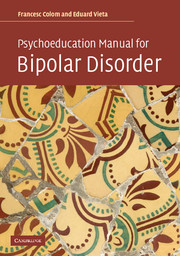Book contents
- Frontmatter
- Contents
- Foreword
- Preface
- Part 1 Clinical, diagnostic, and therapeutic aspects of bipolar disorders
- Part 2 Concept and methodology of psychoeducation
- Part 3 Psychoeducation program: sessions and contents
- Unit 1 Awareness of the disorder
- Session 1 Presentation and rules of the group
- Session 2 What is bipolar disorder?
- Session 3 Etiological and triggering factors
- Session 4 Symptoms I:Mania and hypomania
- Session 5 Symptoms II: Depression and mixed episodes
- Session 6 Evolution and prognosis
- Unit 2 Drug adherence
- Session 7 Treatment I: Mood stabilizers
- Session 8 Treatment II: Antimanic drugs
- Session 9 Treatment III: Antidepressants
- Session 10 Plasma levels of mood stabilizers
- Session 11 Pregnancy and genetic counseling
- Session 12 Psycho-pharmacology vs. alternative therapies
- Session 13 Risks associated with treatment withdrawal
- Unit 3 Avoiding substance abuse
- Session 14 Psychoactive substances: risks in bipolar disorders
- Unit 4 Early detection of new episodes
- Session 15 Early detection of mania and hypomanic episodes
- Session 16 Early detection of depressive and mixed episodes
- Session 17 What to do when a new phase is detected?
- Unit 5 Regular habits and stress management
- Session 18 Regularity of habits
- Session 19 Stress-control techniques
- Session 20 Problem-solving strategies
- Session 21 Closure
- Final note: Is psychoeducation efficacious?
- Bibliography
- Index
Session 17 - What to do when a new phase is detected?
from Part 3 - Psychoeducation program: sessions and contents
Published online by Cambridge University Press: 06 January 2010
- Frontmatter
- Contents
- Foreword
- Preface
- Part 1 Clinical, diagnostic, and therapeutic aspects of bipolar disorders
- Part 2 Concept and methodology of psychoeducation
- Part 3 Psychoeducation program: sessions and contents
- Unit 1 Awareness of the disorder
- Session 1 Presentation and rules of the group
- Session 2 What is bipolar disorder?
- Session 3 Etiological and triggering factors
- Session 4 Symptoms I:Mania and hypomania
- Session 5 Symptoms II: Depression and mixed episodes
- Session 6 Evolution and prognosis
- Unit 2 Drug adherence
- Session 7 Treatment I: Mood stabilizers
- Session 8 Treatment II: Antimanic drugs
- Session 9 Treatment III: Antidepressants
- Session 10 Plasma levels of mood stabilizers
- Session 11 Pregnancy and genetic counseling
- Session 12 Psycho-pharmacology vs. alternative therapies
- Session 13 Risks associated with treatment withdrawal
- Unit 3 Avoiding substance abuse
- Session 14 Psychoactive substances: risks in bipolar disorders
- Unit 4 Early detection of new episodes
- Session 15 Early detection of mania and hypomanic episodes
- Session 16 Early detection of depressive and mixed episodes
- Session 17 What to do when a new phase is detected?
- Unit 5 Regular habits and stress management
- Session 18 Regularity of habits
- Session 19 Stress-control techniques
- Session 20 Problem-solving strategies
- Session 21 Closure
- Final note: Is psychoeducation efficacious?
- Bibliography
- Index
Summary
Goal
The goal of this session is to provide the patients in the group with a structured action plan if any decompensation begins. It is not a session designed to improve any symptoms by cognitive–behavioral intervention as, let us point out one more time, patients in psychoeducation must be euthymic. The goal of the session is prevention, that is, for our patients to learn techniques or acquire resources while they are euthymic that can later serve them during a decompensation.
Procedure
In a single session we will discuss how to act with all types of decompensation. It is advisable not to mix up useful tips for mixed episodes, hypomania, and mania – which are practically the same – with tips for depression, as this may confuse our patients. Thus, we have to divide the session time in the most appropriate way according to our patient profile, and reinforce this or that point according to explicit requests from the group members. Our experience tells us that it is usually necessary to spend more time on mixed episodes, hypomania, and mania than depression. We will now relate the content of a session with 50 min spent on mixed episodes, hypomania, and mania and 30 min on depression, leaving you, the reader, to allocate the time in your own future groups.
Before going into appropriate action at the start of a decompensation, we have to know what resources our patients have available for a mixed or (hypo)manic decompensation, so we can reinforce the right ones and advise against the wrong ones.
- Type
- Chapter
- Information
- Psychoeducation Manual for Bipolar Disorder , pp. 173 - 179Publisher: Cambridge University PressPrint publication year: 2006



